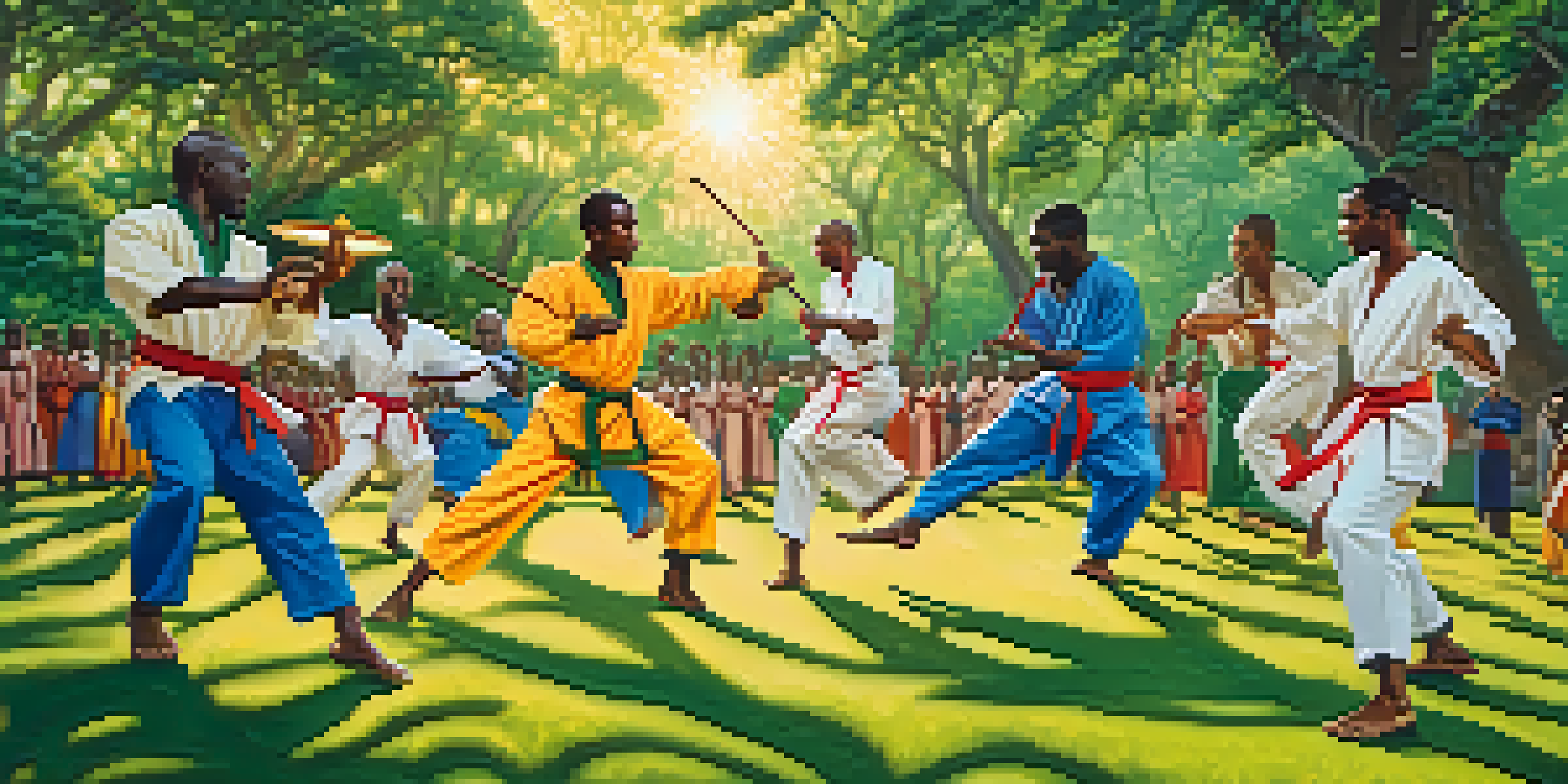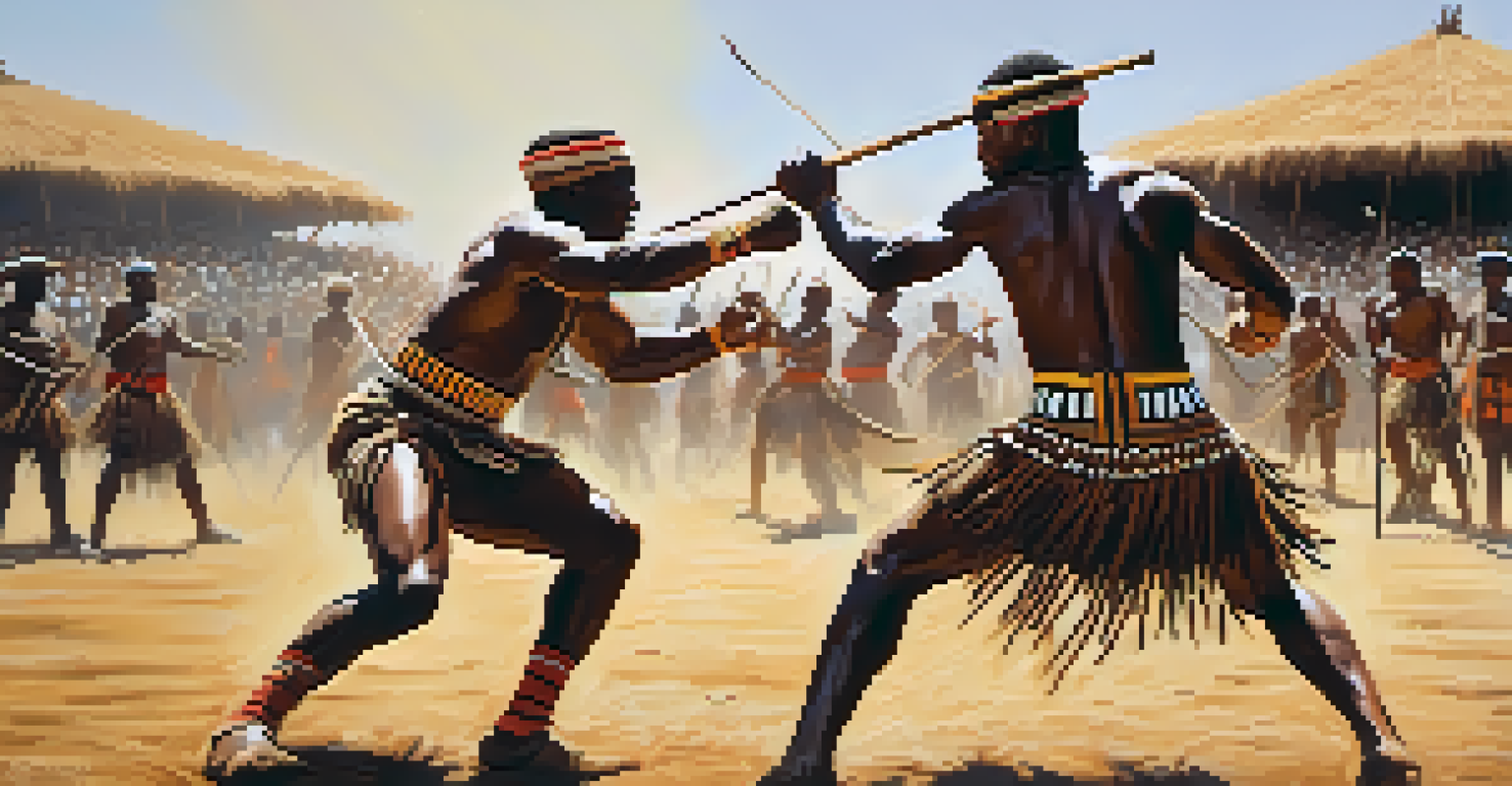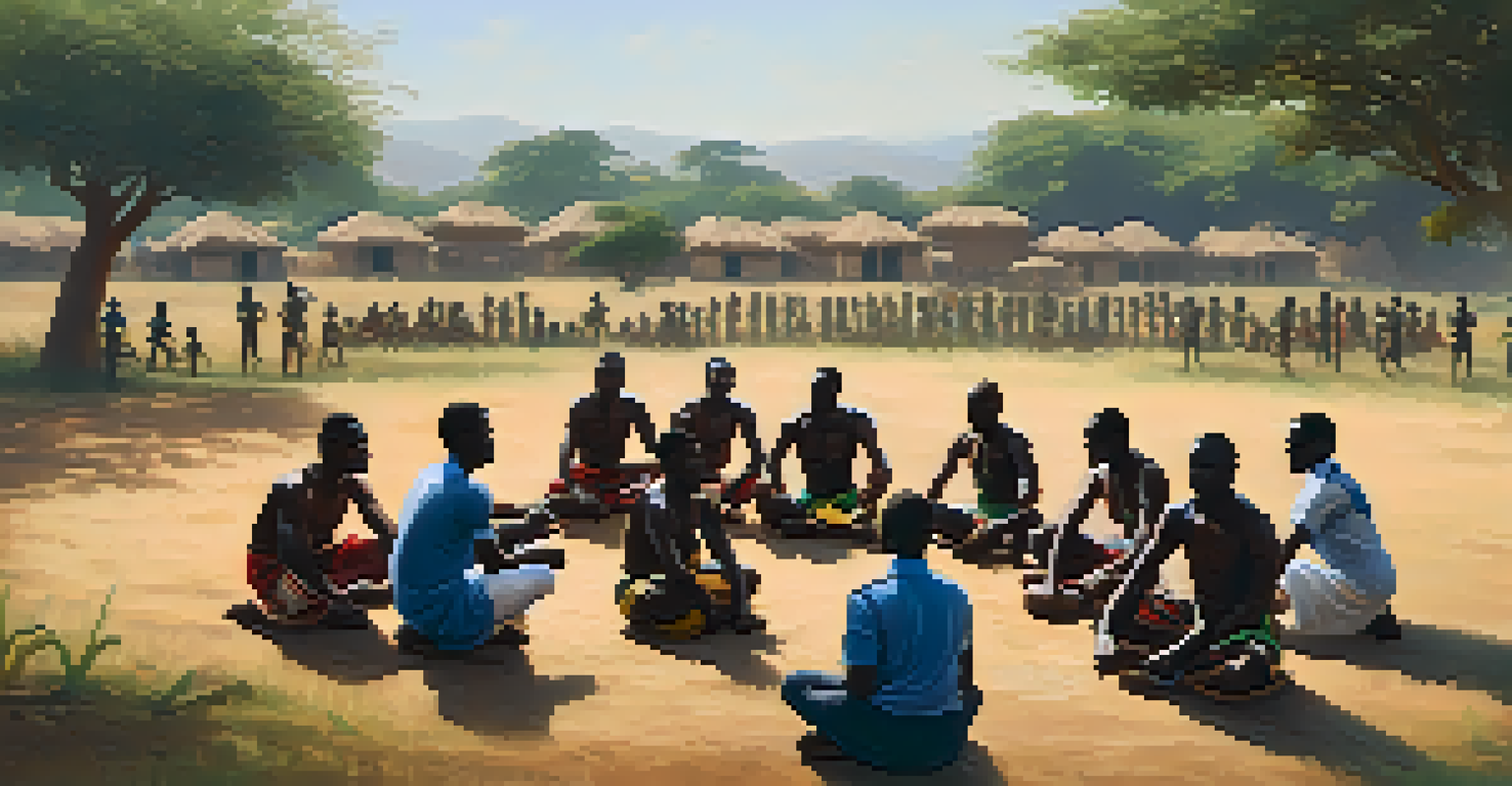Exploring Traditional African Martial Arts and Their Origins

The Roots of African Martial Arts in Ancient Cultures
Traditional African martial arts can be traced back to ancient civilizations, where self-defense and combat skills were integral to survival. These practices were often intertwined with cultural rituals and community gatherings, reflecting the values and traditions of the societies. For instance, many tribes developed unique fighting styles that mirrored their environment, using whatever resources were available to them.
Martial arts are not just about fighting; they are a means of storytelling and preserving history.
These martial arts were not just about fighting; they were a means of storytelling and preserving history. Warriors would demonstrate their skills during festivals, showcasing their techniques and passing down knowledge to younger generations. This connection to heritage is what makes these martial arts deeply significant in the context of African culture.
Today, these traditional arts continue to thrive, often blending with modern practices while retaining their historical roots. They serve not only as a physical discipline but also as a way to reconnect with heritage and foster community spirit.
Key Traditional African Martial Arts Styles
Among the most recognized styles is Capoeira, which originated in Angola and combines elements of dance, acrobatics, and music. This art form was developed by enslaved Africans who used it as a means of resistance, cleverly disguising their combat training within rhythmic movements. It showcases the creativity and resilience of its practitioners, illustrating how martial arts can adapt to societal challenges.

Another notable style is Nguni stick fighting, practiced by the Zulu people of South Africa. This art emphasizes agility and strategy, as fighters use sticks to outmaneuver their opponents. Nguni stick fighting not only serves as a competitive sport but also as a rite of passage, teaching discipline and respect for tradition among the youth.
Cultural Roots of Martial Arts
Traditional African martial arts are deeply intertwined with cultural heritage, serving as a means of storytelling and community bonding.
Lastly, there's the African wrestling style known as Dambe, which is particularly popular among the Hausa people. Practitioners often engage in matches that are both physically demanding and culturally significant, reflecting community values and personal honor. Each of these styles contributes to the rich tapestry of African martial arts, showcasing their diversity and depth.
Cultural Significance of Martial Arts in Africa
Martial arts in Africa extend beyond mere physical combat; they are deeply embedded in the social fabric of communities. These practices often serve as a means of cultural expression, fostering a sense of identity among practitioners. For example, many martial arts are accompanied by traditional music and dance, enhancing the cultural experience and making it a communal affair.
The true essence of martial arts lies in its ability to connect us to our heritage and foster community spirit.
The teachings of respect, honor, and self-discipline found in these martial arts play a crucial role in shaping character. Through rigorous training and participation in competitions, individuals learn valuable life skills that extend beyond the training mat. This holistic approach to martial arts emphasizes the importance of personal development alongside physical prowess.
Furthermore, these martial arts often act as a unifying force in communities, bringing people together regardless of age or background. Events and tournaments can draw large crowds, reinforcing bonds among participants and spectators alike, and creating a shared sense of pride in their cultural heritage.
Influence of Colonialism on African Martial Arts
The history of African martial arts is also marked by the impact of colonialism, which sought to suppress indigenous practices. Many traditional fighting styles were discouraged or outlawed as colonial powers imposed their own systems of governance and culture. This led to a decline in some martial arts forms, as practitioners faced persecution for their heritage.
However, rather than being extinguished, many martial arts adapted and evolved in response to these challenges. Practitioners found ways to maintain their traditions, often blending them with elements from colonial martial arts. This fusion resulted in new forms that still honored their roots while adapting to changing circumstances.
Impact of Colonialism
Colonialism challenged the practice of African martial arts, leading to adaptations that preserved their essence while integrating new influences.
The resilience of African martial arts is evident today, as many practitioners are reclaiming and revitalizing these traditions. This resurgence is essential for cultural preservation, as it allows communities to reconnect with their history and identity, even in the face of historical adversity.
Modern Adaptations and Global Influence
In recent years, traditional African martial arts have gained international recognition, influencing various modern combat sports. Many practitioners have embraced these styles not only for self-defense but also for fitness and personal development. The blend of traditional techniques with contemporary training methods has led to a renewed interest in African martial arts worldwide.
This global reach has sparked a cultural exchange, where martial artists from different backgrounds come together to learn and share. Workshops and seminars are held internationally, showcasing the richness of African martial arts and allowing practitioners to connect with others who share their passion. This exchange fosters a deeper understanding and appreciation of these ancient practices.
Moreover, the popularity of African martial arts in the film industry has also contributed to their global appeal. Movies showcasing these styles have introduced audiences to the beauty and complexity of African combat arts, inspiring many to explore them further. This newfound visibility helps highlight the importance of preserving these traditions for future generations.
Training and Learning Traditional African Martial Arts
Training in traditional African martial arts often involves a holistic approach, combining physical conditioning, mental focus, and cultural education. Instructors emphasize not only the techniques but also the history and philosophy behind each style. This comprehensive training helps students appreciate the significance of their practice and encourages a deeper connection to their ancestry.
Many schools and communities offer programs that cater to all ages, making it accessible for anyone interested in exploring these martial arts. Classes typically include warm-ups, technique drills, and sparring sessions, ensuring a well-rounded experience. The supportive community environment fosters camaraderie among participants, making training a shared journey.
Global Recognition and Future
The rise of traditional African martial arts on the global stage reflects a growing appreciation for cultural diversity and the importance of preserving these practices.
Additionally, many practitioners find that training in these martial arts enhances their overall well-being. The physical demands improve strength and agility, while the mental aspects promote focus and discipline. This blend of benefits makes traditional African martial arts not just a form of self-defense but a path to personal growth.
The Future of Traditional African Martial Arts
Looking ahead, the future of traditional African martial arts appears promising as more practitioners and enthusiasts emerge. Efforts to document and preserve these arts are gaining momentum, ensuring that future generations have access to their cultural heritage. Initiatives aimed at promoting traditional martial arts in schools and communities are also helping to cultivate interest among young people.
As global awareness continues to grow, there is an increasing demand for authentic experiences that celebrate cultural diversity. Traditional African martial arts can play a significant role in this cultural renaissance, offering unique insights into the continent's rich traditions and values. This growing interest is likely to spur further innovation and fusion with other styles while staying true to their origins.

Ultimately, as these martial arts continue to evolve and adapt, they will not only preserve their historical significance but also inspire new generations around the world. This journey of exploration and celebration of African martial arts underscores the importance of heritage in a rapidly changing world.